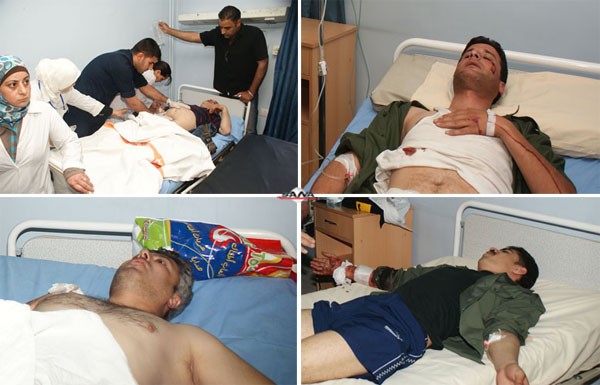Iran Blames Terrorist Attacks in Syria on Foreign States Arming Rebels

 Iran strongly condemned the recent terrorist attacks in Syria, and blamed the current conditions in the Arab country on certain foreign states which fund and arm the Syrian rebels.
Iran strongly condemned the recent terrorist attacks in Syria, and blamed the current conditions in the Arab country on certain foreign states which fund and arm the Syrian rebels.
Iranian Deputy Foreign Minister for Arab and African Affairs Hossein Amir Abdollahian on Saturday both condemned the terrorist attacks in Syria and foreign meddling in the country’s internal affairs.
He said that Syria has been able to successfully live through the security crisis, but some parties are sending arms to the country and back up terrorist moves in there in pursuit of ominous goals and objectives.
“Some sides consider themselves superior to the UN and the plan offered by the UN special representative on Syria, and try to impose their will through hasty moves,” Abdollahian said, and stressed that the problems in Syria can only be resolved through political solutions.
His remarks came after a suicide bomb attack in the Syrian capital city of Damascus on Friday killed, at least, 9 civilians and wounded nearly 30 others.
The blast occurred in the central neighborhood of al-Midan, near a mosque and school, after a terrorist detonated the explosives he was carrying.
It was the second bomb blast to rock the Syrian capital on Friday.
Earlier, a separate blast hit the industrial region in the capital. It was unclear whether there were any casualties in that blast.
Syrian TV blamed the blasts on armed terrorist groups, fighting against the government of President Bashar al-Assad.
The development came a few days after the UN-Arab League Special Envoy on Syria, Kofi Annan, called for the faster deployment of UN peace observers in the Middle-Eastern country as he sees the situation on the ground still “unacceptable” due to the continued violation of his ceasefire plan by the Syrian rebel groups.
The Syria issue has split the Arab world, with the West-backed hardline states, including Qatar and Saudi Arabia, advocating arming Syrian rebels and calling for Assad’s departure, while others including Iraq want to see a political solution.
Earlier this month, several Persian Gulf Arab states and the United States pledged 100 million dollars to provide salaries and communications equipment for the Syrian rebels fighting against the government.
The countries, led by Saudi Arabia, Qatar and the United Arab Emirates, made the offer at an Istanbul conference of the so-called “Friends of Syria”, a grouping of some 70 Western and Arab countries, which Damascus calls the “enemies of Syria”.
Syria has been experiencing unrest since March 2011 with organized attacks by well-armed gangs against Syrian police forces and border guards being reported across the country.
Hundreds of people, including members of the security forces, have been killed, when some protest rallies turned into armed clashes.
The government blames outlaws, saboteurs, and armed terrorist groups for the deaths, stressing that the unrest is being orchestrated from abroad.
In October, calm was eventually restored in the Arab state after President Assad started a reform initiative in the country, but Israel, the US and its Arab allies are seeking hard to bring the country into chaos through any possible means. Tel Aviv, Washington and some Arab capitals have been staging various plots in the hope of stirring unrests in Syria once again.
This is while Assad has done a lot in recent months to reform laws and conditions in his country. The Syrian president announced the end to the state of emergency, granted citizenship to many Syrian Kurds and promised parliamentary elections later this year. In January, he issued the latest of thousands of amnesties for those detained since the uprising began.
Syria also in February held a referendum on the country’s new constitution. More than 14 million Syrians over 18 could vote and almost 90 percent of the voters approved a new constitution in the referendum.
Under the new charter, freedom is ‘a sacred right’ and ‘the people will govern the people’ in a multi-party democratic system based on Islamic law, the state television reported.
The document allows multiple political parties to compete in elections for the legislature, sets a limit of two seven-year terms on the president, and eliminates a clause that guarantees political supremacy to Assad’s Ba’ath Party.







